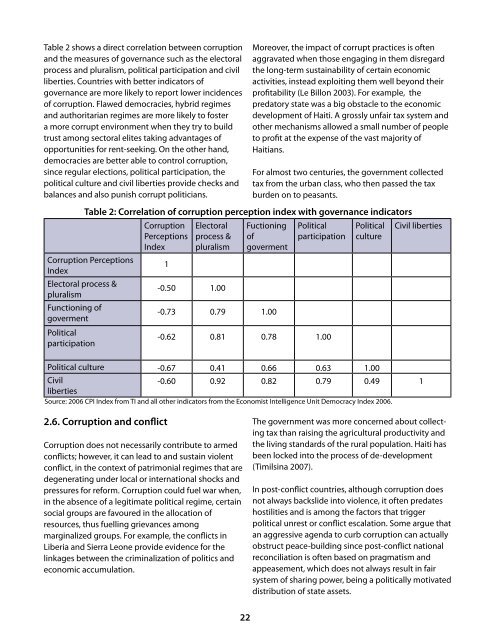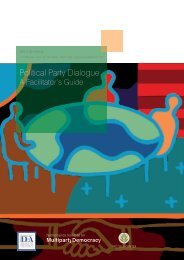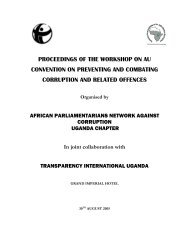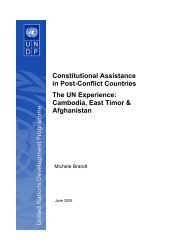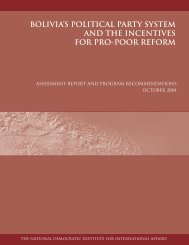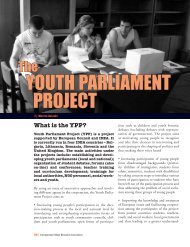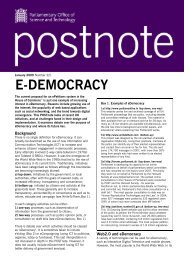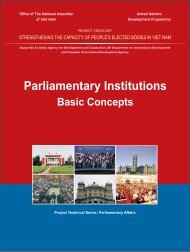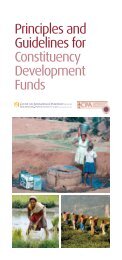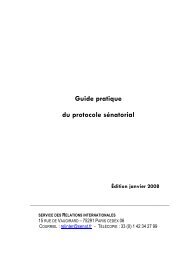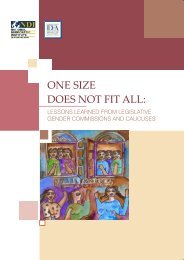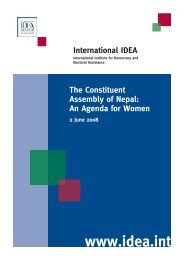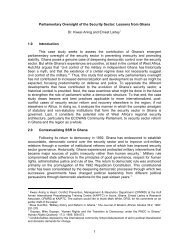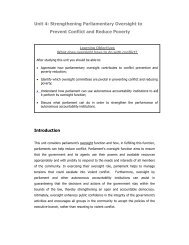Corruption and Development - pogar
Corruption and Development - pogar
Corruption and Development - pogar
You also want an ePaper? Increase the reach of your titles
YUMPU automatically turns print PDFs into web optimized ePapers that Google loves.
Table 2 shows a direct correlation between corruption<br />
<strong>and</strong> the measures of governance such as the electoral<br />
process <strong>and</strong> pluralism, political participation <strong>and</strong> civil<br />
liberties. Countries with better indicators of<br />
governance are more likely to report lower incidences<br />
of corruption. Flawed democracies, hybrid regimes<br />
<strong>and</strong> authoritarian regimes are more likely to foster<br />
a more corrupt environment when they try to build<br />
trust among sectoral elites taking advantages of<br />
opportunities for rent-seeking. On the other h<strong>and</strong>,<br />
democracies are better able to control corruption,<br />
since regular elections, political participation, the<br />
political culture <strong>and</strong> civil liberties provide checks <strong>and</strong><br />
balances <strong>and</strong> also punish corrupt politicians.<br />
Moreover, the impact of corrupt practices is often<br />
aggravated when those engaging in them disregard<br />
the long-term sustainability of certain economic<br />
activities, instead exploiting them well beyond their<br />
profitability (Le Billon 2003). For example, the<br />
predatory state was a big obstacle to the economic<br />
development of Haiti. A grossly unfair tax system <strong>and</strong><br />
other mechanisms allowed a small number of people<br />
to profit at the expense of the vast majority of<br />
Haitians.<br />
For almost two centuries, the government collected<br />
tax from the urban class, who then passed the tax<br />
burden on to peasants.<br />
Table 2: Correlation of corruption perception index with governance indicators<br />
<strong>Corruption</strong> Electoral Fuctioning Political Political Civil liberties<br />
Perceptions<br />
Index<br />
process &<br />
pluralism<br />
of<br />
goverment<br />
participation culture<br />
<strong>Corruption</strong> Perceptions<br />
Index<br />
1<br />
Electoral process &<br />
pluralism<br />
-0.50 1.00<br />
Functioning of<br />
goverment<br />
-0.73 0.79 1.00<br />
Political<br />
participation<br />
-0.62 0.81 0.78 1.00<br />
Political culture -0.67 0.41 0.66 0.63 1.00<br />
Civil<br />
-0.60 0.92 0.82 0.79 0.49 1<br />
liberties<br />
Source: 2006 CPI Index from TI <strong>and</strong> all other indicators from the Economist Intelligence Unit Democracy Index 2006.<br />
2.6. <strong>Corruption</strong> <strong>and</strong> conflict<br />
<strong>Corruption</strong> does not necessarily contribute to armed<br />
conflicts; however, it can lead to <strong>and</strong> sustain violent<br />
conflict, in the context of patrimonial regimes that are<br />
degenerating under local or international shocks <strong>and</strong><br />
pressures for reform. <strong>Corruption</strong> could fuel war when,<br />
in the absence of a legitimate political regime, certain<br />
social groups are favoured in the allocation of<br />
resources, thus fuelling grievances among<br />
marginalized groups. For example, the conflicts in<br />
Liberia <strong>and</strong> Sierra Leone provide evidence for the<br />
linkages between the criminalization of politics <strong>and</strong><br />
economic accumulation.<br />
The government was more concerned about collecting<br />
tax than raising the agricultural productivity <strong>and</strong><br />
the living st<strong>and</strong>ards of the rural population. Haiti has<br />
been locked into the process of de-development<br />
(Timilsina 2007).<br />
In post-conflict countries, although corruption does<br />
not always backslide into violence, it often predates<br />
hostilities <strong>and</strong> is among the factors that trigger<br />
political unrest or conflict escalation. Some argue that<br />
an aggressive agenda to curb corruption can actually<br />
obstruct peace-building since post-conflict national<br />
reconciliation is often based on pragmatism <strong>and</strong><br />
appeasement, which does not always result in fair<br />
system of sharing power, being a politically motivated<br />
distribution of state assets.<br />
22


